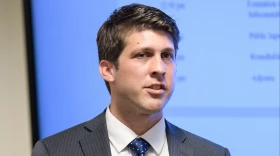House and Senate higher-education budget negotiators are eyeing the elimination of a $600 annual stipend that covers textbook costs for Bright Futures scholarship recipients.
Conference committees met Saturday as the House and Senate are in the process of ironing out a budget for the coming fiscal year.
Cutting the Bright Futures textbook stipend, provided to scholarship recipients known as Academic Scholars who receive 100 percent tuition assistance, would represent a nearly $37.5 million reduction in higher education spending.
Senate Education Appropriations Chairman Doug Broxson, R-Gulf Breeze, said he expects the program’s elimination to be in the state budget when the spending plan is finalized.
“That’s something that we’ve looked at. We are doing a lot for the Bright Futures. We’ve expanded in some areas. Right now we’re just looking at that not being part of the budget. It’s a decision we made early, and that’s probably where we’re going to end up staying,” Broxson said.
House Higher Education Appropriations Chairman Rene Plasencia, R-Orlando, told reporters the stipend was “subsidizing textbook companies.”
Plasencia added that lawmakers are considering bolstering open-access digital textbook offerings at state universities.
“We want to start a program where we can bring it to the state level, and provide our students --- all students, not just academic award winners for Bright Futures --- with low-cost textbooks,” Plasencia said.
The House and Senate are in agreement on fully funding the Bright Futures scholarships at nearly $651.8 million during the fiscal year that will start July 1.
Funding for the scholarships has become a contentious issue amid debate about a Senate proposal (SB 86) that would tie aid amounts to money set aside in each year’s budget. The Senate passed the measure April 8.
“We had a very healthy debate about what Bright Futures would look like. We heard the public, they said they believe in it,” Broxson said.
The Senate also is in agreement with a House budget recommendation to eliminate nearly $18.5 million in “excess” faculty salaries at universities.
The reduction stems from a plan to place a $200,000 cap on general revenue funds that can be used for individual faculty salaries.
“Right now, there is a cap on university presidents at $200,000. What we want to make sure is that in the using of general revenue, that there’s also a cap for our faculty as well,” Plasencia said.
Universities would still be able to pay faculty salaries in excess of $200,000 using funds from other areas of their budgets. Both chambers also are eyeing the elimination of Access to Better Learning and Education, a tuition assistance program serving students at for-profit private institutions. The program is funded at $4.6 million in the current year.
Copyright 2021 WUSF Public Media - WUSF 89.7. To see more, visit WUSF Public Media - WUSF 89.7. 9(MDAyMTYyMTU5MDEyOTc4NzE4ODNmYWEwYQ004))




